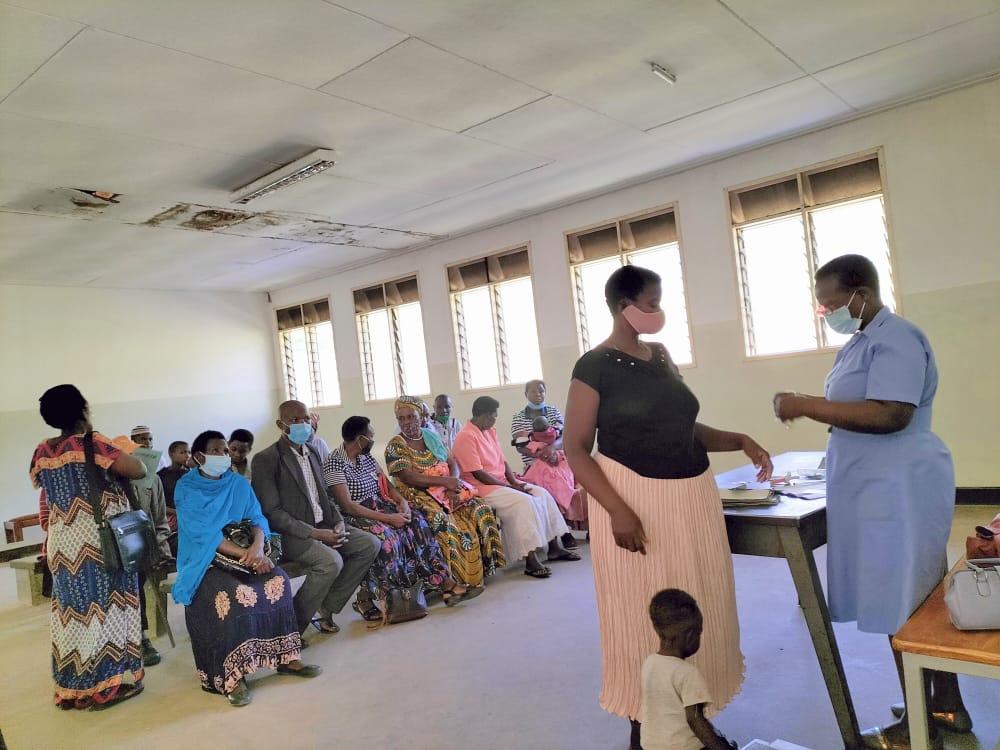By Boaz Namanya
Jolly Tukwasibwe, 53, a health worker at Kambuga Referral Hospital in Kanungu district, South
Western Uganda, had no idea she and her family would face stigma and discrimination from the
community as a result of the COVID-19 infection.
June 2021 was one of the country’s worst months of the year. The country witnessed a spike in
its COVID-19 infections. Although Jolly took precautions at work, she was infected and become
a patient.
‘’I had initially assumed I was suffering from severe flu or malaria,’’ said Jolly
As a result of her underlying conditions, she was later diagnosed with diabetes and
hypertension and weakened by the virus.
After testing positive at work, she went into self-isolation to avoid infecting others.
She also had other family members, but she wasn’t sure if they were infected.
Having devoted all of her efforts as a frontline worker in the medical field for over 17 years, she
spoke up about her illness to caution her community to adhere to the COVID-19 guidelines
However, her COVID-19 story was used as a weapon for stigma and discrimination.
Her husband, Ndyagasha Gad, 54, a peasant farmer, revealed that, as was customary, he hired
casual workers to work in his banana and coffee plantations; however, a different picture was
painted when many declined his calls in fear that they would be infected by COVID-19.
This had an emotional impact.
“It was painful when the community turned my message of recovery and hope from COVID-19
to something else when myths and misinformation about COVID-19 were prevalent and
damaging” expressed Tukwasibwe.
When one of her neighbors, the late Jolly Barimukyabo, went to test for COVID-19 and died as a
a result, it was extremely difficult for the community to believe COVID-19 is not a death
sentence.
“I instructed the community health workers to approach people and persuade them that
COVID-19 can be treated and the effects and someone can completely recover,” said
Tukwaswibe.
She became involved in the sensitization of COVID-19 awareness around the communities after
her complete recovery to address the harmful attitudes meted out to her and the families of
her neighbors
According to Jolly, “churches and schools were closed, despite the fact that they would have
been the best spaces to meet several groups and share the messages at the same time.”
She noted that after she returned to full strength, gathering large groups of people became
easier.
She contacted district officials, who gave her permission to broadcast radio announcements to
gather people.

In terms of institutional support, some instances of psychological, managerial, material, and
technical assistance was positively acknowledged, which helped her.
However, a lack of equipment, including the unavailability of suitable Personal Protective
Equipment (PPEs) at hospitals and other treatment centers, was one of the most prominent
unmet needs during the pandemic, and at its peak, most people died.
Also, finding the means to get to the hospital was a huge challenge. Most people in the area
relied on boda boda or public vehicles. A problem, Tukwasibwe understood.
Edwin Mpagi, a clinical officer at Kambuga hospital and Jolly’s colleague, attended one of the
many awareness activities. He praises Jolly for her bravery and strength to share her story.
Mpagi noted that after many community meetings, people were able to learn, and people in
their communities were able to throw away the myths propagated by social media.
Initially, some people in Kanungu district believed that COVID-19 was a stunt by the
government to allocate funds to various ministries for their own benefit.
Some community members who spoke to us say that it felt like any other disease outbreak like
influenza, malaria, HIV but when the strict lockdowns were announced, it was hard to face the
the reality of the COVID-19 pandemic.
Jolly’s message has been driven home as many now understand that COVID-19 still exists but
can be avoided. At Kambuga hospital where she works, many patients and other members
around wear their face masks throughout as this was one of her core targets to enhance
protection.
The hospital security guard Bwire also acknowledged that the sensitization has reached the
community and is still being implemented. “Even when the cases dropped, many hospital
visitors still understood the message as heard on radio and around their communities” noted
Bwire.
Glory Tugabirwe Jolly’s neighbor commended her efforts to fight the deadly virus. “Even at
church, you will rarely see congregants being asked to social distance or have their masks on.
They do it. It’s a new normal” said Glory.
Aggrey Kajura the head of security in Muhokya town council revealed that Jolly’s heroism eased
their enforcement. Aggrey added “we stopped running up and down with our people, especially
the business people compelling them to have hand washing facilities at their shops because
they also heed to her message and it has tremendously worked for us”
According to Jacob Ampeire, Public Relations Officer at the Ministry of Health, they have
created various platforms for COVID-19 survivors to continue to express themselves in the
community.
He praised Jolly and other dedicated Ugandans for their support during and after the fight
against COVID-19.
He did, however, emphasize the importance of continuing to follow standard operating
procedures, stating that there is more laxity in the communities now that COVID-19 infections
are on the rise.
This publication was produced with the financial support of the European Union. Its contents
are the sole responsibility of Boaz Namanya and do not necessarily reflect the views of the
European Union.
